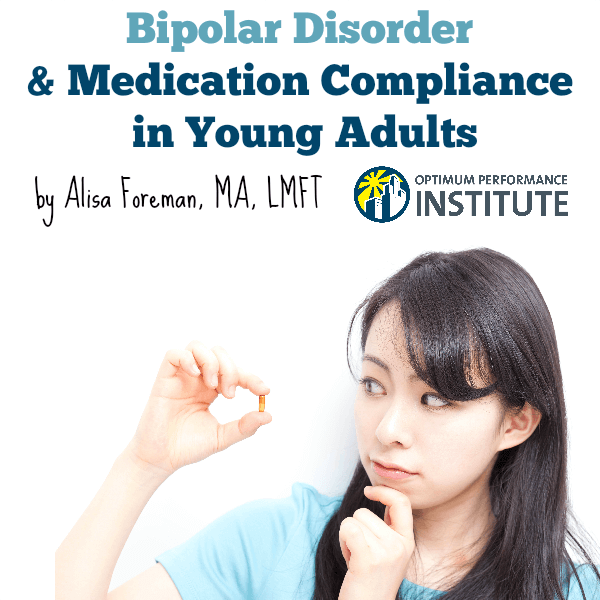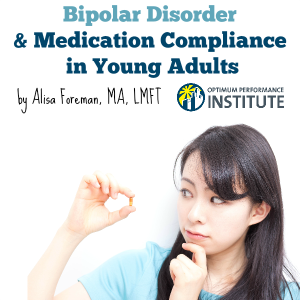
Bipolar Disorder Medication: Compliance in Young Adults
 Living with Bipolar Disorder can often feel like a roller coaster ride with the highs of mania and the lows of depression. In addition, there are also the twists and turns on that ride based on a person’s environment, including stressors, coping skills, support system, and lifestyle. While some people go to amusement parks, ride roller coasters and go home, others are left to ride this intense, often emotionally dysregulating mental health roller coaster throughout their entire lives. The good news is, there interventions that allow young adults with bipolar disorder to experience relief, more balance, and the potential for a more stable and productive life. Let’s begin by looking at the two main types of Bipolar Disorder.
Living with Bipolar Disorder can often feel like a roller coaster ride with the highs of mania and the lows of depression. In addition, there are also the twists and turns on that ride based on a person’s environment, including stressors, coping skills, support system, and lifestyle. While some people go to amusement parks, ride roller coasters and go home, others are left to ride this intense, often emotionally dysregulating mental health roller coaster throughout their entire lives. The good news is, there interventions that allow young adults with bipolar disorder to experience relief, more balance, and the potential for a more stable and productive life. Let’s begin by looking at the two main types of Bipolar Disorder.
BIPOLAR 1 vs. BIPOLAR 2
For some, the lows feel as though the floor beneath them is falling out, like they are free-falling from 1000ft in the air. Meanwhile, the highs provide a thrill of a lifetime (manic episode) that they never want to end. This is referred to as Bipolar 1.
For others, the ride is relatively smooth with just a couple of peaks and valleys, and this experience is often referred to as Bipolar 2.
REGULATING THE ROLLER COASTER
In my experience working at OPI’s residential treatment program with young adults dealing with Bipolar Disorder, medication provides a huge benefit in helping stabilize mood and creating a smoother ride throughout life.
There are a few difficulties that we see when it comes to medication compliance and this particular disorder, meaning that young adults aren’t always gung-ho about taking a daily medication in order to feel “normal” and regulated. Further, many of them report feeling like “guinea pigs,” having tried numerous medications over the years only to find that the side-effects outweighed the benefits if any. At OPI, we overcome this issue by offering GeneSight, a painless cotton swab to the inside of the cheek that allows us to perform genetic testing. GeneSight helps take the guesswork out of which medications will likely have the most benefits and least side effects for the young adult in a very individualized way, based on his or her unique DNA.
Another common resistance to taking medication for Bipolar Disorder is that most people are used to taking a medication to treat a symptom or illness and then stop once the condition has resolved. For many people diagnosed with Bipolar Disorder, accepting not only the fact that they have this diagnosis but also the fact that they may need to be on medication for the rest of their life is a very difficult pill to swallow (no pun intended). In addition, as I was saying before, many people with Bipolar experience the highs of mania to be a thrill. They feel carefree, invincible, and experience a sense of euphoria. Now, who would want to take a pill that takes that incredible feeling away? The unfortunate part is that along with those feelings there also tends to be reckless behavior, poor impulse control, and poor judgment which can have long-term negative effects on someone’s life including one’s job, relationships, and finances.
And what goes up must come down, which means depression is inevitable for people suffering from Bipolar Disorder. Unfortunately, without medication, those lows get lower. Depression is often associated with a decrease in mood, energy level, and interest. It can also make concentration and decision making difficult. Depression impacts not only mood, but also sleep, appetite, and self-esteem and sometimes even leads to suicidal ideations or attempts. Medication helps lessen the severity of depression and creates more stability in a person’s mood.
At OPI’s residential treatment program, we believe in the benefits of medication in treating Bipolar Disorder, but not in medication alone. Our psychiatrists work collaboratively with our participants to help them understand the benefits of medication and the importance of medication compliance. In addition to psychiatry, we provide therapy to assist young adults with learning and understanding their diagnosis so that they can begin to accept it while building healthy coping skills to manage the highs and lows associated with the disorder. We also have a variety of departments to assist them with finding a life path that will fit with their lifestyle and provide them with a sense of joy and stability. While people with Bipolar Disorder cannot completely get off the roller coaster ride of life, they can definitely find a way to slow it down and create a smoother ride.
If you enjoyed this article, you may like to next read: Bipolar: How it can impact the ability to maintain a steady job and how we help.
At Optimum Performance Institute, we offer compassionate, clinically sophisticated intensive residential help for young adults who suffer from bipolar disorder, including genetic testing to determine the best course for medications as needed. Rather than a sterile, hospital-like environment, we offer beautiful accommodations in luxury apartments just outside of Los Angeles. At OPI, we treat the individual, not the diagnosis. We are a diverse community of passionate, highly skilled individuals working together with you to help you find your joy and express it. For more information on OPI residential programs and our measures to help young adults with Bipolar Disorder, call us at (888) 814-5985 or click HERE to submit an online form. We’ll be in touch promptly.
